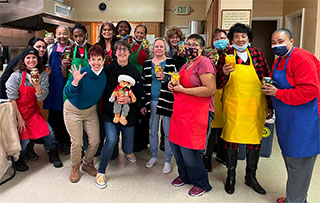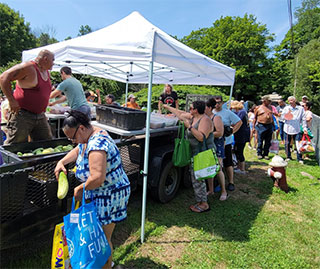Partnerships for Environmental Public Health (PEPH)
Study Location: New Jersey
Academic Partners:
New York University Grossman School of Medicine
Judith Terry Zelikoff, Ph.D.
University of New Mexico Health Sciences Center
Esther Erdei, Ph.D.
Community Partners:
Ramapough Lunaape Turtle Clan
Munsee Three Sisters Medicinal Farm
Project Description

The Ramapough Lunaape Turtle Clan members in northern New Jersey live on a 500-acre designated Superfund site contaminated with heavy metals and solvents from thousands of gallons of paint sludge dumped by local industry over a decade.
The Turtle Clan community faces an elevated risk of negative health effects from growing traditional food in contaminated soil and from exposure to tainted recreational water sources. To date, no culturally meaningful solutions have been implemented that promote Tribal health and well-being.
This interdisciplinary and multi-partner project, led by the New York University (NYU) Grossman School of Medicine and the University of New Mexico, addresses food insecurity, nutritional deficiency, and chronic disease health outcomes among the Turtle Clan community.
Project partners hypothesize that a complex array of factors — including soil, water, and plant contamination; psychosocial stressors; displacement; and environmental assaults to the land — have led to a loss of food sovereignty and sustainability. Partners hope that food security and cultural food practices can be renewed through a community-engineered farming system and educational strategies.

The project will adapt and implement a community-centered farming program on the Munsee Three Sisters Medicinal Farm, which was founded by the Turtle Clan. The program will be directed by a community advisory board consisting of Turtle Clan Chief Vincent Mann, site administrator Michaeline Picaro, and six Turtle Clan community members who will meet monthly at the local church-associated community center.
Project partners will assess the development process and early outcomes of the farm program using an implementation science framework.
Students will work closely with community partners on creating designs for the farm, facilitated through weekly meetings with the Turtle Clan chief and the site administrator. They will share initial schematic design ideas for farm layout, including teaching spaces, medicinal gardens, planting plans, native plant restoration strategies, community meeting spaces, an outdoor kitchen, a classroom space, and a private space for body measurements and biological specimen collection and storing. With direction from Chief Mann, they will adjust the designs and create a package of design documents that will be useful to the Turtle Clan in their efforts to reconceptualize land relations.
The team will apply a mixed methods design and a citizen science and community-based participatory research approach. All community activities will be driven by the Turtle Clan to properly reflect community priorities and integrate the Tribe’s linguistic, social, and cultural mores, knowledge, and expertise. A holistic approach attuned to the social determinants of health and the multiple levels of influence, including community, families, and the environment, will guide this project.
The project builds on nearly 10 years of NYU’s equitable Tribal-academic partnership with the Ramapough Lunaape Turtle Clan to advance tradition-centered, evidence-based, best-practice strategies for sustainable food systems and environmental health.
As Chief Mann observed, “Return of healthy soil on our farm will allow healthy plant production, resulting in healthy foods to nurture our bodies and mind with optimum results.”
Specific project aims are to:
- Assess the extent of environmental contamination, individual toxic chemical burdens, micronutrient levels, and health disorders in Turtle Clan Tribal members.
- Identify and implement safe and nutritious farming practices and restore food sovereignty through development of a farming program supported by the Munsee Three Sisters Medicinal Farm.
- Integrate a culturally centered environmental road map, created from community input, for food sovereignty and sustainability.
- Share and disseminate the road map to other environmentally impacted Native American Nations.
- Create an environmental public health action plan based on research findings that can be easily shared with other Native American Nations across the country.
Related Links


